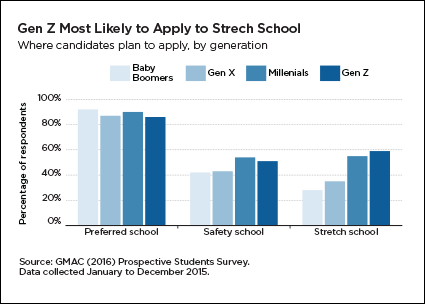The first generation of “digital natives” is taking the GMAT™ exam and deciding where to apply.

Business schools that think they finally have a handle on how to connect their school brand with the Millennial generation may find themselves in need of a new playbook to prepare for the next wave of prospective students—Generation Z. Also known as “Post-Millennials,” “iGen,” or “Centennials,” Generation Z is just now coming of age, with the oldest in their teens and early 20s. Born roughly between 1996 and 2010, they number nearly 60 million according to US Census data and will soon overtake Millennials as the largest generational segment of the US population.
For the first time, they are showing up in small but measurable numbers in GMAT testing data. In the most recent GMAT testing year that ended June 30, 2015, 127 test takers born between 1996 and 1998 (ages 18 to 20) sat for the exam. Members of Gen Z also showed up in sufficient numbers—slightly more than 100—to analyze in the findings from GMAC’s mba.com Prospective Students Survey conducted in 2015 among individuals who registered on mba.com, the portal for the GMAT exam. More than half (53%) of these Gen Z survey respondents were women and nearly all (96.5%) were between the ages of 16 and 19, with the remaining aged 20 to 24—meaning most are still enrolled either as secondary or undergraduate students.
What sets Generation Z apart from Millennials? They are first generation to come of age in the 21st century and the first true “digital natives.” Whereas Millennials learned to embrace technology (first using Facebook and cell phones as college undergrads), Generation Z was born immersed in it, knowing only a world of touchscreens, social media, smartphones, and apps. They have an intuitive relationship with technology and practically live online, blending the real world with the virtual world as they multitask and maintain personal relationships across multiple digital platforms at the same time.
Advertising professionals characterize Gen Z as pragmatic and cautious—growing up in a post-9/11 environment of world conflict, terrorism, and a global recession has made them more realistic about their opportunities. They are less likely to take for granted that their lives will be perfect, or that a perfect job awaits them. They seek more financial security and stability, and are more money-conscious, given rising levels of student debt. The Gen Z students represented in the GMAC’s recent Prospective Student Survey bear out these observations:
- A majority of Gen Zers (53%) strongly agree that financial security is extremely important and more than half (51%) think that graduate business school will require more money than they have available;
- Compared with Millennials, far more Gen Zers (60% vs. 41% of Millennials) place a high level of importance on their careers and work and nearly twice as many Gen Zers (40%) regard personal wealth as important to their personal lives as do Millennials (23%).
Yet, according to
Advertising Age, Gen Zers “respond to independence and entrepreneurialism, self-direction and a spirit of ingenuity” and are more likely to make their own success than Millennials.
- In GMAC’s survey findings, 39 percent of Gen Zers said they are interested in entrepreneurship as a career goal, compared with just 25 percent of Millennials, and 45 percent strongly agree that they enjoy finding innovative solutions to problems.
- Forty-one percent see graduate business school as a means of increasing their entrepreneurial opportunities.
More than half of Gen Zers also view graduate business school as a means to explore what they want to do in life (53% vs. 40% of Millennials), which may possibly explain their tendency to begin thinking about graduate management education three and half years before completing their undergraduate degree—earlier than any other survey respondents. More than a third (37%) of Gen Zers have thoroughly researched the programs where they plan to apply, and compared with other generational cohorts, the majority (54%) of Gen Zers are the most intent on getting into the best graduate business school possible. This may explain the fact that they are more likely than all other prospective students to consider a stretch school (59%), even though they may not qualify.

For more insights into Generation Z and Millennials, download the
2016 mba.com Prospective Students Survey Report. Business school professionals at schools that accept the GMAT exam also have access to an
Interactive Data Report that accompanies the survey summary, which allows you to search raw survey data by numerous demographic variables.